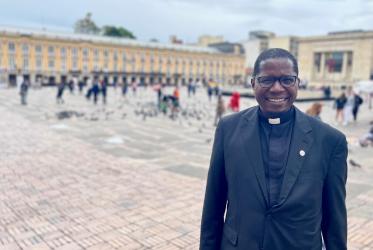World Council of Churches
CENTRAL COMMITTEE
Geneva, Switzerland
12-20 September 1996
Document No. 4.2
Introduction
The Unit IV Committee recognizes that diakonia, martyria and koinonia are essential elements of the central mission of the church. Koinonia without diakonia is dead. Sharing and service as practical actions are at the heart of our fellowship and are a source of our unity.
For many churches within the ecumenical fellowship today, the search for unity in the church and the world means struggling for truth and justice in the places where they live, engaging in practical acts of solidarity where human dignity and community are at stake, empowering individuals and communities to confront the forces of fragmentation and marginalization.
ACTION I
The Unit IV Committee recommends to Central Committee that the World Council of Churches articulates its continued commitment to ecumenical diakonia as expressed in: § promoting justice, § practical actions of solidarity, § capacity building and empowerment and § networking and advocacy. These mandates are interrelated and essential and serve the unity and witness of the churches, and therefore the Unit IV Committee recommends to Central Committee that this be articulated more specifically in any purposes and functions of the WCC (e.g. CUV draft, para. 3.11).
I.Common Understanding and Vision
The Unit IV Committee devoted one day to discussing and formulating comments and recommendations for the Common Understanding and Vision (CUV) process.
Proposed revisions to the Common Understanding and Vision draft document were submitted to the General Secretariat and are included in this report as annex 1.
II.Strategy for Jubilee - Phase II
The Unit IV Committee reflected on the implications of the Common Understanding and Vision process for the Jubilee Strategy (adopted by Central Committee in 1995, see annex 2) and on the work of sharing and service within the life of the WCC. The Strategy for Jubilee was further elaborated by the Committee.
The Unit IV Committee recognizes the central importance of continuing and developing the functions of sharing and service as an integral part of the mandate of WCC.
The Unit IV Committee commends to Central Committee the continued implementation of the Strategy for Jubilee, based on the following mandates.
1.To promote the commitment to justice
2.To promote practical actions of solidarity
3.To promote capacity building and empowerment
4.To promote networking and advocacy
The shift in emphasis by the Unit, from implementation to the enhancement and facilitation of the churches' own involvement and actions with the poor and excluded, is involving considerable adjustments in the Unit's working style and methods (the creation of ACT and the renewal of the Round Table System are just two examples of this).
ACTION II
With a view to the future profile of the Council, the Committee recommends that Unit IV - Sharing and Service continues to further sharpen its role as 'enabler, coordinator, communicator, convenor and mediator' in very practical ways:
a. to enable agreements between churches and ecumenical partners or agencies in specialized areas of work, such as emergencies (ACT);
b. to coordinate conduct, policy and practice in the ecumenical sharing of resources;
c. to gather and communicate information and data which will help partners to work together more effectively;
d. to convene and facilitate Round Tables and other mechanisms put into place by the WCC, its member churches and related councils and agencies, which will ensure:
- § the common understanding of and agreement on priority issues in the churches' witness and service;
- § the commitment of a relevant number of partners to act - on behalf of the whole fellowship - on those priorities, and
- § the mutual accountability of all partners involved with regard to the respective tasks which they have committed themselves to.
III. Ecumenical action in advocating for the rights of children
The effects of global, social and economic changes today, have dramatic consequences on the daily life of children and adolescents, as well as on their future. Marginalization, abandonment, abuse and sexual exploitation of children and other forms of violence are increasing worldwide.
In the light of this reality, many organizations and some churches have taken initiatives to respond to specific issues and to promote children's rights. It is clear that churches can and should do more to respond in an effective way to the dramatic situation affecting our children taking care to address root causes.
Following the September 1995 Central Committee approval to give priority to the rights of children, Unit IV invited, in May 1996, children and adults to a small "International Consultation on the Rights of Children" held in Geneva.
From their practical experiences the participants in this consultation identified the main causes of child exploitation and discussed strategies for effective ecumenical action in support of the rights of children. The presence of children from children's organizations and projects made more visible the dramatic and violent situation affecting the life of so many children. It also revealed the tremendous capacity of these children to analyze their situation and to articulate strategies for action.
ACTION III
Responding to the dramatic and violent situation in which millions of children around the world live and the urgent request from children for the churches' commitment and spiritual leadership in the search for solutions to their problems, the Unit IV Committee recommends the following resolutions for adoption:
a. to call on member churches and related agencies to continue to mobilize their human, moral and material resources to defend and protect the life and integrity of children.
b. to request Unit IV to continue supporting advocacy work and networking for the rights of children with the direct involvement of children's organizations around the world.
III. Churches' Solidarity with Uprooted People
In September 1995, the WCC Central Committee adopted unanimously the Statement on Uprooted People, A Moment to Choose: Risking to be with Uprooted People. It also adopted four related resolutions, including one designating 1997 as the Ecumenical Year for Churches in Solidarity with the Uprooted. The Central Committee called on member churches and related agencies to study and affirm the document, to manifest the commitment of the churches to be on the side of uprooted people by witnessing and serving at all levels of the life of the churches, and to share a progress report with the General Secretary by mid-1997 on actions taken.
Since then, numerous member churches and related agencies have initiated new efforts in solidarity with the uprooted and many have begun to plan special activities for 1997. The WCC Refugee and Migration Service has focused on assisting and building the capacity of member churches to engage with the issues and to implement the recommendations. However, other member churches have yet to actively engage in following up the Central Committee statement, its recommendations, and the accompanying resolutions.
ACTION IV
a. Unit IV Committee commends the many churches which have already responded for the actions they have taken so far in implementing the recommendations of the WCC Statement on Uprooted People and the related Central Committee resolutions.
b. Unit IV Committee further urges all WCC member churches and related organizations to mobilise resources and organize activities to mark 1997 as the Ecumenical Year of Churches' Solidarity with Uprooted People.
Annex 1
Proposals of the Unit IV Committee to the General Secretariat on the Common Understanding and Vision document
The Unit IV Committee expressed appreciation for the Common Understanding and Vision process.
It welcomed the opportunity for a broad participation of churches and partners in the discussion of the draft of this document and offers the following comments and recommendations as a contribution to its revision:
- § The Unit IV Committee recommends the strengthening of the affirmation in paragraph 1.2, that the ultimate goal of the ecumenical movement is both the unity of the church and the integrity of the whole creation (Common Understanding and Vision para. l.2).
- § The Unit IV Committee affirms the integrity of the ecumenical movement. Faith and order, life and work, worship and mission, service and fellowship: they are one and inseparable.
- § The Unit IV Committee recommends that in the Common Understanding and Vision document the relationship between ecumenical reflection and practical actions of solidarity is given greater attention and visibility.
- § The Unit IV Committee recognizes that diakonia, martyria and koinonia are essential elements of the central mission of the church. Koinonia without diakonia is dead. Sharing and service as practical actions are at the heart of our fellowship and is a source of our unity. The Unit IV Committee recommends that this be articulated more specifically in any purposes and functions of the WCC (cf. para. 3.11).
The Unit IV Committee recommends that the World Council of Churches, in its Common Understanding and Vision document, articulates the World Council's commitment to justice, to practical actions of solidarity, capacity building and empowerment and networking and advocacy as being interrelated and essential for the unity and witness of the churches.
- § The Unit IV Committee reaffirms mediation and advocacy as important tasks for the World Council of Churches and recommends that these tasks be carried out from the perspective of concrete life experiences of people at the local level.
- § The Unit IV Committee recognizes the existence of a complex network of ecumenical relationships, mutual responsibilities and expectations involving the existing structures of the World Council of Churches. Sudden change or disruption would have serious implications beyond the Council itself.
The Unit IV Committee recommends that this be taken into account in any discussion of future structures and profile of the WCC.
a. The Unit IV Committee recommends further definition of the practical implications for the work of the World Council of Churches of the deepening of the relationship with the Roman Catholic Church, both at local and international level (cf. para. 4.3.1).
b. The Unit IV Committee recommends that consideration be given to the importance of relating to and cooperating with people of other faiths, particularly in response to human need.
Annex 2
VISION STATEMENT
The World Council of Churches Programme on Sharing and Service assists member churches and related ecumenical agencies and organizations to:
PROMOTE HUMAN DIGNITY AND SUSTAINABLE COMMUNITY WITH THE MARGINALISED AND EXCLUDED by:
1. Working with the marginalised and excluded for a more just sharing of resources through developing alternative models of international cooperation, and a better understanding and respect for the diversity of resources needed (economic, ecological, social, cultural and spiritual) to create sustainable communities.
2. Promoting practical actions of solidarity which reflect our commitment to a more just sharing of resources amidst growing poverty, displacement and exclusion, locally and regionally.
3. Promoting capacity building and empowerment within communities to rediscover and develop their own potential and resources, and to preserve the dignity and right of individuals and communities to determine their own destinies.
4. Promoting networking and advocacy with uprooted, marginalised, conflict and disaster stricken communities, ensuring that they have access to speak for themselves at all levels; local, national and international.



